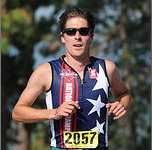Improve Running Performance Through Consistent Training
Recently, I emailed a buddy of mine to see if he wanted to get a run or ride in together during the work week. He is an accomplished athlete and, like me, works a full-time job. His response caught me a little off-guard as I expected a resounding "yes!" Instead he replied with a list of his workouts and the rather cryptic message "I am not doing many filler miles." I wanted to reply, "Well, there's your problem," as I had always thought he hadn't reached his potential as a runner, but then I drew a distinction between consistency and mileage. He was trying to tell me that he was getting all his workouts in, but he wasn't a slave to the mileage as he once was, perhaps. But it got me thinking about my second rule: Consistency
Consistency
To be a successful runner is a relative thing. For some it may be finishing their first 5k or even a marathon. For others, it may be running a sub-15 minute 5k. Ultimately, if you reach either, you can consider yourself a success and you will probably have to exert the same amount of discipline and work relative to your fitness to meet those goals. But how you go about it is a different animal altogether.
Arthur Lydiard, the famous running coach, very simply described consistency in a concept that any of us competitive types could consume. He queried that if you took two identical runners (your clone, if you will) and gave one a rest day once a week while ther other ran everyday, who would be better prepared? Over the course of a year, that's nearly a two month gap between the two athletes and my money is on the consistent guy. I know what you are thinking, and yes, rest is a good thing and can be beneficial and make you faster, but we need to redefine the "rest day" so that it doesn't kill the consistency or the routine.
Redefining "Rest Day"
The fact of the matter is you can run every day and stay healthy and run the best times of your life. There are a lot of variables that go into your training and ultimately your success: volume, frequency, duration, intensity, terrain, ect. All of these affect how good it is we will become as runners, but it is the routine that chisels it into stone or tempers the steel.
In college we ran a couple of days of speed work and raced on the weekend. The rest of the week consisted of recovery runs and some strength training. Each type of run was tuned to meet a specific need, but there weren't many days off. Injuries were always looming ominously, but the routine in my opinion remained the most significant variable. And the rest day was really an "easy day". One of the most significant changes that I recently made to my training week was 15-20 minute treadmill run on my "rest day". Basically, I added a quick 15 minute run on the treadmill in the morning of my "day off" and it is never faster than a typical easy run and I never care how slow it is. This primes the pump, if you will, and it serve two purposes:
1. It is a physiological recovery exercise
2. Keeps my training routine going
Back to my buddy mentioned above and his "filler miles" comment. Ultimately, I believe there is no such thing as a filler mile. You have a string of workouts and each have their own specific purpose and each mile counts. If you do them all at the same speed and distance, well the problem isn't the mileage, it's what you do with the mileage.
A foolish Consistency is the . . . . .
This isn't to say you can't be foolish in your quest to be more consistent with your running. You wouldn't run an interval workout everyday and you probably wouldn't run a marathon every day. If you do you are going to be sick and injured all the time and won't be able to run at all, so it's self-policing. But you need to be clear on setting your goals, identifying your hard and easy days, and building slowly for the hong haul.
Routine
Start setting the routine like you would anything else in your life. You wouldn't show up to work only part of the time if you were expected there every day. Set a specific time to get your run in and stick to it. Adjust your night habits and bedtimes to accommodate the change. Lay off the last beer or glass of wine if it is going to be easy to skip the morning workout. Turn off the TV (or computer) or wait to get the workout done before you relax. Small sacrifices and an adjustment of habits reinforce the routine. The routine lead to consistency with your training. Consistency leads to success.
Get over yourself
This is the tough love part of the lecture. You are going to run into roadblocks. Doctor's appointments, kid's tee-ball games, overgrown lawn, homework-these all make sense and take precedence. GIVE YOUR FAMILY FIRST DIBS ON YOUR TIME, but get over the excuses that you have stockpiled and derail your routine. You know what these are. Knock it off!
Success
The best way to enforce consistency and routine is success. You win a race, attain a goal, or set a Personal Record and you will easily keep it going. Running with consistency helps you reach your Ideal Performance State.
Some things to remember:
1. Listen to your body. Take that day off when you need it but don't let it become your default position.
2. Set the routine. Designate a specific time like lunch hour as your run time and think of it as a positive not a chore.
3. Too many days off and you are going to get hurt. Your trend line should never be full of peaks and valleys. You'll never gain fitness and you'll be running too hard on your regular days.
4. There is no such thing as "filler mileage". Make sure your workouts are planned appropriately and don't fall into foolish habits.
5. Measure your success. Keep track of your progress and notice the trends. My bet is you will be getting faster and hitting your goals.
6. Get a coach if you need one. If you don't know how to set a training schedule, then it might be worth getting a coach to guide you. At the very least there are many books on the subject with lots of training plans from which to choose.
Chris Harig is competitive runner, multisport athlete, and coach based in the
Seattle area. In 2007 and 2008, he was the top American at the ITU Duathlon
World Championships.
More about Chris Harig.





